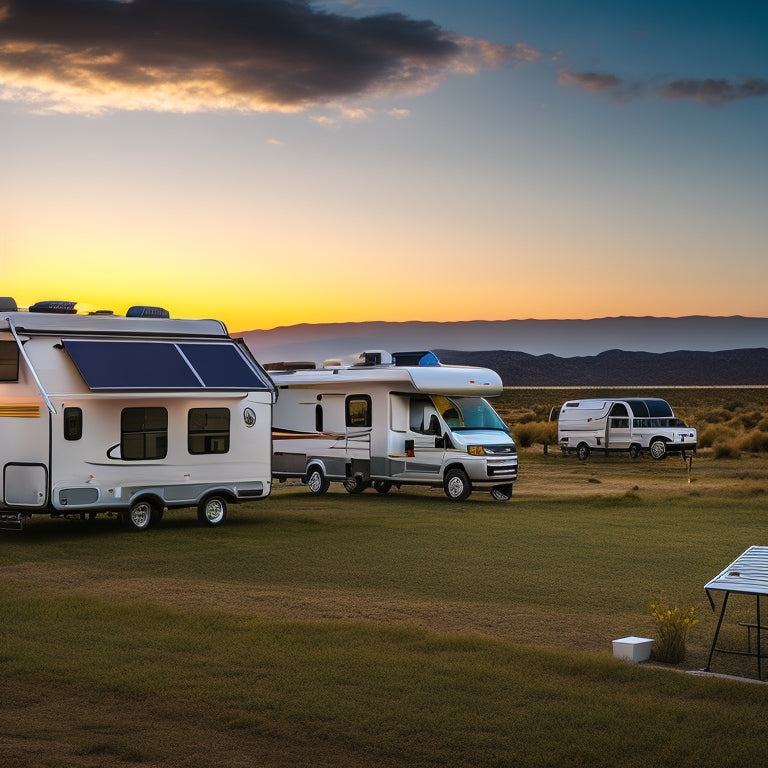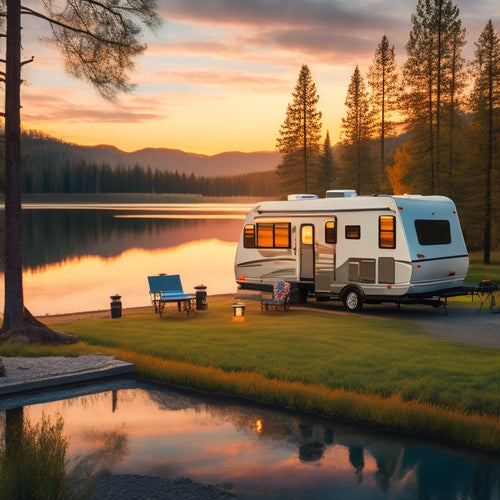
10 Essential Tips for Affordable RV Energy Solutions
Share
To guarantee a reliable and affordable RV energy system, begin by evaluating your daily energy needs and optimizing your power profile. Then, choose energy-efficient appliances, solar panels, and an inverter system that meet your requirements. Don't forget to invest in a high-quality deep cycle battery and prioritize its maintenance. Efficient lighting and proper insulation will also help reduce energy consumption. Finally, monitor your system's performance and address any issues promptly. By following these essential tips, you'll be well on your way to a stress-free RV adventure - and there's even more to discover when you take the next step.
Key Takeaways
• Assess daily energy usage and conduct an energy audit to determine total watt-hours per day and optimize energy efficiency.
• Select energy-efficient appliances and lighting, and consider investing in high-quality deep cycle batteries for reliable power supply.
• Ensure proper installation and maintenance of solar panels, inverters, and battery systems to maximize energy output and minimize costs.
• Insulate and weatherstrip the RV to conserve energy, and monitor energy logs to make informed decisions about energy usage.
• Prioritize affordable energy storage solutions, such as AGM or lead-acid batteries, and invest in a battery monitoring system for optimal performance.
Assessing Your RV's Energy Needs
To determine the best energy solution for your RV, start by calculating your daily energy usage, including the number of lights, appliances, and devices you'll be powering. This is essential in determining your energy needs and finding the most suitable solution.
Conducting an energy audit will help you identify areas of inefficiency and opportunities for improvement. By analyzing your power profile, you'll gain a clear understanding of your energy consumption patterns. This will enable you to make informed decisions when selecting energy-efficient appliances and devices.
When creating your power profile, consider factors such as the type and number of devices, their wattage, and usage duration. This information will help you determine the total watt-hours (Wh) per day, which is essential in sizing your energy system.
Choosing the Right Solar Panel
When choosing the right solar panel for your RV, you'll need to take into account a few key factors to guarantee you're getting the most out of your investment.
First, you'll want to assess your power requirements to determine how much energy you need to generate.
Assessing Power Requirements
You'll need to accurately calculate your RV's daily energy needs to determine the right size and number of solar panels for your off-grid adventures. To do this, you'll need to conduct an energy audit and load calculation.
An energy audit involves identifying all the appliances and devices in your RV that consume energy, including lights, refrigerators, laptops, and more. Make a list of these items and note their wattage ratings. Next, estimate how many hours a day each device will be used. This will give you a total daily energy requirement in watt-hours (Wh).
For example, if you have a 20W light that's used for 8 hours a day, that's 160Wh. Add up the total energy requirements for all your devices to get your daily energy needs. This calculation will help you determine the size of the solar panel system you need.
An accurate load calculation guarantees you'll have enough power to meet your energy needs, without overspending on a larger system than necessary. By doing your energy audit and load calculation, you'll be able to choose the right solar panel system for your RV, ensuring a reliable and efficient off-grid energy solution.
Selecting the Right Size
With your daily energy needs calculated, it's time to evaluate the right size of your solar panel system, which will depend on factors like your RV's roof space, budget, and the amount of energy you need to generate.
You'll want to assess the maximum power output you need to meet your RV's power demands. For instance, if you have a lot of appliances and gadgets, you'll require more power to keep them running.
When selecting the right size of your solar panel, think about the space available on your RV's roof. You don't want to overcrowd your roof with too many panels, but you do want to maximize your energy generation.
A good rule of thumb is to start with a smaller system and add more panels as needed. This approach will help you save on upfront costs and allow for future RV upgrades.
Considering Efficiency Ratings
Choosing the right solar panel for your RV energy needs involves evaluating efficiency ratings, as a higher efficiency rating can greatly impact the amount of energy you can generate with limited roof space.
When shopping for solar panels, you'll come across various energy labels and rating standards. Look for panels with high efficiency ratings, typically above 20%. This guarantees you're getting the most energy possible from your limited roof space.
Check for certifications from reputable organizations, such as the International Electrotechnical Commission (IEC). These certifications assure the panel meets specific rating standards. Be wary of extremely low-priced panels, as they might compromise on efficiency. A higher upfront cost for a high-efficiency panel will pay off in the long run with increased energy production.
When comparing panels, consider the temperature coefficient rating, which affects energy output in high-temperature conditions. A lower temperature coefficient means the panel will maintain its efficiency even in hot weather.
Selecting a Compatible Inverter System
When selecting a compatible inverter system for your RV, it's essential to take into account the specific electrical demands of your appliances and devices in order to facilitate seamless power conversion. You'll want to calculate your total power requirements, taking into consideration factors like the number of devices, their wattage, and usage patterns. This will help you determine the best-suited inverter size, ensuring you can power your essentials without overloading the system.
Inverter sizing is vital, as an undersized inverter can lead to poor performance, while an oversized one can be a waste of resources. You'll also need to consider system integration, ensuring your inverter is compatible with your battery bank, charging system, and other components.
A well-integrated system will optimize energy efficiency, reduce energy losses, and provide a reliable power supply. By carefully selecting a compatible inverter system, you'll be able to enjoy the comforts of home while on the road, without breaking the bank.
Maximizing Energy With Deep Cycle Batteries
You'll want to invest in a high-quality deep cycle battery that's specifically designed to meet the unique demands of RV living, as it will be the backbone of your energy system.
This type of battery is engineered to provide a steady flow of power over an extended period, making it ideal for RV applications.
To maximize the energy output of your deep cycle battery, it's important to prioritize battery maintenance. This includes monitoring the state of charge, keeping the battery terminals clean, and ensuring proper ventilation.
Regular maintenance will help extend the cycle life of your battery, allowing you to enjoy reliable power for years to come. A well-maintained deep cycle battery can provide up to 500 cycles or more, making it a worthwhile investment for any RVer.
Efficient Lighting for Your RV
With your deep cycle battery providing a reliable source of power, it's time to optimize your RV's lighting system to minimize energy consumption and maximize visibility. One of the simplest ways to achieve this is by switching to LED alternatives. LED lights consume considerably less energy than traditional incandescent bulbs and last longer, making them an ideal choice for RV owners.
When designing your lighting layout, consider the following:
| Area | Traditional Lighting | LED Alternative |
|---|---|---|
| Interior | 20-30W incandescent bulbs | 2-5W LED strips |
| Exterior | 50W halogen floodlights | 10-15W LED floodlights |
| Reading | 10W incandescent lamps | 1-2W LED reading lamps |
Energy-Saving Appliances for RVs
Upgrade to energy-efficient appliances to slash your RV's power consumption and extend your off-grid adventures. By making a few strategic appliance upgrades, you'll be able to enjoy the freedom of boondocking without worrying about running out of juice.
Start by swapping out your old refrigerator for an energy-efficient model designed specifically for RVs. These units use considerably less power and can make a substantial dent in your overall energy consumption.
Next, consider upgrading to a low-flow water heater, which can save you up to 50% on your energy costs. Don't forget to switch to energy-efficient fans and ventilation systems to keep your RV cool and comfortable while minimizing power usage.
With these appliance upgrades, you'll be able to camp off-grid for longer periods without sacrificing comfort. By implementing these energy hacks, you'll be able to enjoy the great outdoors without worrying about your energy supply.
Insulating and Weatherstripping Your RV
By sealing air leaks and adding insulation to your RV, you can dramatically reduce heat loss in the winter and heat gain in the summer, which can help you conserve energy and stay comfortable while camping off-grid.
As an RVer, you know how important it is to stay warm during those chilly winter nights and cool during the scorching summer days. A well-insulated RV can make all the difference.
When it comes to RV renovation, insulation is a crucial aspect to consider. Start by checking for gaps and cracks around windows, doors, and vents. Seal these openings with a weatherstripping material like spray foam or caulk to prevent heat from escaping.
Next, inspect your RV's insulation, paying attention to areas like the ceiling, walls, and floor. Consider adding insulation materials like foam board or reflective insulation to keep the temperature inside your RV consistent.
With a well-insulated RV, you'll be able to enjoy winter camping without worrying about freezing temperatures and stay cool during the summer months without overheating.
Affordable Solar Panel Installation
You can harness the power of the sun to recharge your RV's batteries and reduce your reliance on generators and hookups with affordable solar panel installation. By investing in a solar panel system, you'll not only save money on energy costs but also minimize your carbon footprint.
Before you begin, research local building codes and obtain necessary Solar Permits to guarantee a smooth installation process.
When selecting an installation company, look for experienced professionals who specialize in RV solar panel installations. They'll assess your energy needs, recommend the right system size, and ensure a secure, watertight installation. Be sure to ask about warranties, maintenance requirements, and potential upgrades.
A reputable Installation Company will provide a detailed quote, including materials, labor, and any additional components needed for a seamless integration with your RV's electrical system.
With the right installation, you'll be enjoying the freedom of off-grid camping and reducing your reliance on public hookups in no time. By investing in affordable solar panel installation, you'll reap the benefits of renewable energy and join a community of like-minded RV enthusiasts who value independence and sustainability.
Monitoring and Maintaining Your System
Proper maintenance is essential to optimizing your solar panel system's performance and extending its lifespan, so it's vital to regularly inspect and clean your panels to guarantee maximum energy harvesting.
You'll want to perform system checks regularly to identify any issues or potential problems. Check your energy logs to monitor your system's performance and identify areas for improvement. Keep an eye out for signs of wear and tear, such as loose connections or corrosion, and address them promptly.
Regular maintenance will also help you stay on top of energy consumption and production. By monitoring your energy logs, you can identify patterns and make adjustments to optimize your energy usage.
For instance, you may notice that you're using more energy during peak hours or that certain appliances are using more power than expected. With this information, you can make informed decisions about your energy usage and adjust your habits to maximize your system's efficiency.
Budget-Friendly Energy Storage Options
When it comes to storing energy for your RV adventures, affordable options are essential to keeping your travels powered without breaking the bank. You can't always rely on hookups or generators, so having a reliable energy storage system is vital. The good news is that you don't have to break the bank to get one.
For budget-friendly energy storage options, consider deep cycle batteries like AGM or lead-acid batteries. They're affordable, reliable, and can be charged and discharged multiple times.
Another cost-effective option is lithium-ion batteries, which may be more expensive upfront but offer longer lifetimes and faster charging times.
To maximize your energy budget, prioritize energy-efficient appliances and lighting, and invest in a battery monitoring system to keep track of your energy usage.
By implementing these cost-cutting measures, you'll be able to enjoy your RV adventures without worrying about energy costs. Remember, energy budgeting is key to keeping your travels powered affordably.
With the right budget-friendly energy storage options and cost-cutting strategies, you can explore the open road without breaking the bank.
Frequently Asked Questions
Can I Use Regular Batteries Instead of Deep Cycle Batteries?
"You might think you can save money using regular batteries, but did you know 80% of deep cycle batteries last 5-7 years, while regular batteries last only 1-2? Invest in deep cycle batteries for longer battery lifespan and easier battery maintenance."
How Often Should I Clean My Solar Panels for Optimal Performance?
You should clean your solar panels regularly to prevent dust accumulation, which reduces energy output. Aim to clean them every 2-3 months, or more often in dusty areas, to maintain peak performance and maximize energy harvest.
Will an Inverter System Work With a Generator-Powered Rv?
You're wondering if an inverter system will work with your generator-powered RV? Yes, it can! As long as your system is compatible, an inverter can seamlessly switch between generator power and battery power during a power outage.
Are Energy-Efficient Appliances Compatible With Older RV Models?
When upgrading your older RV model, you'll likely face compatibility issues and retrofit challenges with energy-efficient appliances, but with careful planning and research, you can overcome these hurdles and enjoy a more sustainable lifestyle on the road.
Does RV Insurance Cover Solar Panel Damage or Theft?
'As you navigate the open road, think of your RV insurance as your trusty compass. But, will it guide you through solar panel damage or theft? Check your policy for exclusions and understand the claim process to guarantee you're protected.'
Related Posts
-

Why Choose Affordable Electric Scooters for Urban Commuting
By choosing an affordable electric scooter for urban commuting, you'll not only reduce your transportation costs by u...
-

What's the Best Green Ride for College Budgets?
As a college student on a budget, you're likely looking for an eco-friendly ride that won't break the bank. You've go...
-

Why RV Owners Need Solar Panels for Battery Life
You can greatly extend the life of your RV's batteries by switching to solar power. By harnessing the sun's energy, y...


